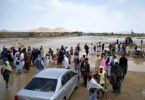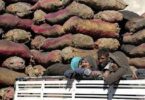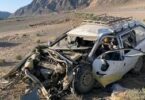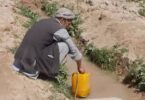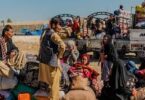KABUL (Pajhwok): Kabul residents are happy with the snowfall, calling it a blessing from Allah. They are optimistic Afghanistan will not see drought next year. In an interview with Pajhwok Afghan News, Kabul resident Samiullah Nazari, who sells tea in Qargha, said he was happy with the snowfall. It would end the drought and boost crop yields in the spring, he hoped.
Sangar Uruzgani, who had come to Qargha for fun from Uruzgan, told Pajhwok he wanted to take pictures of the scenic location and have fun there. While filming the lake, Uruzgani enjoyed the snowfall and called it a good omen. He wanted the prolonged dry spell in the country to end.
Bilal, a resident of Qargha who trains people on horse-riding, said he had a good business during the snowfall. He bought the horse for 80,000 afghanis and earns about 400 to 500 afghanis a day.
Ajmal, hailing from Khair Khana neighbourhood, had come to the lake along with friends. He believed: “The people of Afghanistan, having suffered a lot, should enjoy even the smallest happiness.” He urged Afghans, who wanted go abroad, not to leave their homeland, stay in their country and play their role in its reconstruction. Mohammad Zia, a resident of Kart-e-Chahar area who had come to Qargha with his family, said they were enjoying the snowfall. He said they had come to enjoy the snowy weather and hoped it would help overcome the drought in the country.
Meanwhile, heavy snowfall and flooding in various parts of Afghanistan have taken the lives of at least 10 people, said authorities. Based on reports, around 10 people have died and more than 30 others have been injured in avalanches and weather-related accidents in Badakhsan, Bamyan, Nimroz, Farah, Jawzjan and Faryab provinces.
Meanwhile, the Salang Pass Protection Department says that heavy snowfall in the south of Salang has closed the Kabul-North highway, and in the past 24 hours, this route has been opened only Intermittently to the traffic. In the past 24 hours, more than twenty provinces of the country have witnessed heavy snowfall, and a deadly avalanche in the Raghistan district of Badakhsan killed five people and caused significant financial damage.
“It has been three days now that transportation routes have been closed due to heavy snowfall, and many people have died due to floods,” said Bashir Ahmad, a resident of Badakhshan. In the meantime, several traffic incidents have also been reported as a result of snowfall and flooding in Faryab, Laghman, Bamyan and Jawzjan provinces, leaving around 10 people dead and 33 injured.
“We have ordered our teams to provide services for those who have been affected by floods and snowfall and to start operations to save people’s lives as soon as possible,” said Maulvi Enayatullah, deputy minister of disaster management. This comes as heavy rains in the south of the country caused flooding in Maiwand district of Kandahar province which resulted in the closing of the Kandahar-Helmand highway.
“Heavy rains have taken many lives and caused great financial damage to the people, and so far we have not received any assistance,” said Mir Hamza, a resident of Kandahar. The National Environmental Protection Agency issued a statement urging people to dig wells to replenish groundwater, and to use snow to refill their wells.
Local officials said a snow leopard caused havoc in the Dara-e-Asik area of Zibak district in Badakhshan in the early hours of Thursday morning and killed and injured dozens of sheep. Badakhshan officials said they ordered Islamic Emirate of Afghanistan (IEA) forces to safeguard the leopard and to release it unharmed back into the wild.
“We ordered the Mujahedin to surround the neighborhood where the leopard was trapped, and not to allow anyone or any group to kill this rare wild animal, and …return it to nature safely,” said Mazuddin Ahmadi, Head of Information and Culture of Badakhshan province. Ahmadi said the leopard had been returned safely to the wild. According to him, the IEA is serious about preserving the number of snow leopards in Badakhshan, adding that the animal’s presence is a drawcard for foreign tourists.
Snow leopards have in the past been known to kill sheep in the far northern province – especially in winter. In spring, farmers in the same area lost 20 sheep while 63 more were killed last winter. However the Wildlife and Snow Leopard Project paid the farmers out, said Ahmadi. Snow leopards, which are found across central and south Asia live above the tree lines in the mountain ranges and are found in the Zebak and Wakhan districts of Badakhshan, which share borders with Pakistan, China and Tajikistan. However, Badakhshan Department of the Environment officials said they are hoping international wildlife organizations will assist them in the future in their attempts to safeguard the snow leopard population in Afghanistan and to help prevent future attacks against domestic livestock.
Meanwhile, officials of the state ministry for Disaster Management of the Islamic Emirate of Afghanistan said that they have directed provincial officials about their further preparedness for rain and snowfall and that a state of emergency has been announced in the country.
Speaking with Radio Free of Afghanistan (REF/RL) an official of the ministry Muhammad Amin Mubariz said that they had sent material to provinces of which the distribution is still going on. Mubariz added that they are in contact with the Ministry of Public Work and private firms to urgently undertake their operation of reopening ways in case the ways close due to heavy snowfall.
Salang highway that connects the Afghan capital with Northern provinces has been left clogged due to heavy snowfall and wind. There is currently repeated snow and rainfall in 32 out of 34 provinces of Afghanistan that has clogged routes and have also erupted flood in several provinces.

